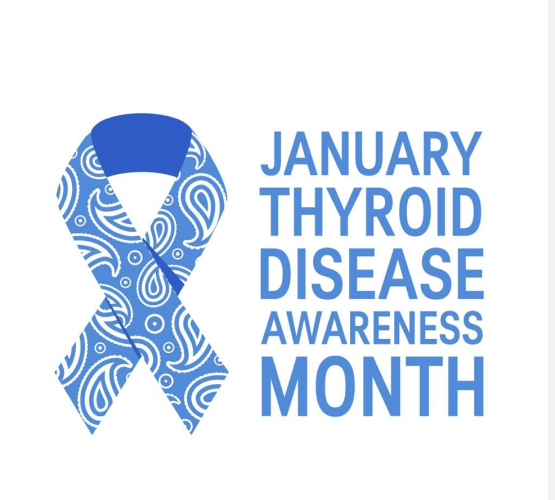
2023 Weight & Thyroid Refresher
As January rolls (make sure this is changed in the blurb for the article as well) around, we enter Thyroid Awareness Month once again. Understanding the possible influence of thyroid function on weight can be a complex and difficult undertaking when it comes to managing weight and it is important to get quick refreshers to stay on track with your health.
This blog will serve as a review of thyroid health and weight control in 2023. We will discuss methods for controlling weight and thyroid health, such as dietary and lifestyle adjustments, as well as the most recent studies on how thyroid conditions might impact weight.
What Is Thyroid Awareness Month? (change font color, can not see on the website)
To quickly jog your memory, an annual event called Thyroid Awareness Month is held to increase public understanding of thyroid problems and the significance of thyroid health. Since January is a month when many people are considering their health and setting plans for the new year, it is typically selected as the month for this observance.
Various organizations aim to inform the public about thyroid problems, their symptoms, and the value of early identification and treatment during Thyroid Awareness Month. The occasion presents the opportunity to increase public knowledge of the many thyroid problems, including hypothyroidism and hyperthyroidism, and the effects they may have on the body as well as how to deal with them properly.
How Do Thyroids Affect Weight? (change font color, can not see on the website)
The thyroid gland can influence a person’s weight in various ways. A gland located in the neck, the thyroid, is responsible for the production of hormones that control metabolism. Hypothyroidism is a disorder that can result in weight gain and is brought on when the thyroid fails to generate enough of the hormone that it normally does. On the other hand, if the thyroid produces an excessive amount of the hormone, this might result in a condition known as hyperthyroidism, which can cause a person to lose weight.
In either scenario, therapy with medicine to control the levels of the thyroid hormone may help resolve any concerns related to weight gain or loss. In addition, the usage of some medications for the treatment of thyroid disorders might come with the potential adverse side effects of either weight gain or reduction, for that reason we always recommend speaking to our experts first for a proper treatment plan.
What Is The Impact Of Thyroid Health On Metabolism? (change font color, can not see on the website)
The thyroid gland is responsible for the production of hormones, which control the body’s metabolism, or the process by which it transforms food into energy. These hormones, which go by the names thyroxine, or T4, and triiodothyronine, or T3, are responsible for regulating the pace at which the body consumes calories and energy. When the thyroid gland is not operating as it should, it can throw off the body’s metabolism, which in turn can lead to fluctuations in body weight.
A sluggish metabolism might be the result of hypothyroidism, a disease in which the thyroid gland does not produce enough hormones. This can result in increased body fat and make it harder to shed excess pounds. On the other hand, hyperthyroidism, a disease in which the thyroid gland generates an abnormally high number of hormones, can cause a rapid metabolism, which in turn can lead to a loss of weight and make it difficult to gain weight.
When there is an imbalance in thyroid hormones, the body’s metabolism may be disturbed, which may lead to changes in weight. People who have hypothyroidism have a greater propensity to put on weight or have trouble shedding weight, whereas people who have hyperthyroidism may experience weight reduction.
What Lifestyle Changes Can You Make For Thyroid Health?
Modifications in lifestyle may be done in several different ways to promote thyroid health, including the following:
Iodine Supplements: Iodine is necessary for the creation of thyroid hormones; therefore, it is crucial to ensure that you are consuming a sufficient amount of iodine either via your diet or through the use of supplements.
Manage Stress: It is vital to find healthy methods to manage stress since stress can impair the functioning of the thyroid gland. Some examples of good ways to manage stress include exercising, meditating, and participating in therapy.
Get Sufficient Sleep: Adequate sleep is necessary for maintaining general health, including the health of the thyroid. Aim to get between 7 and 9 hours of sleep each night.
Physical Activity: Maintaining a healthy weight and improving the function of the thyroid gland are two benefits that may be attained by consistent and regular physical activity, namely exercise.
Steer Clear Of Environmental Pollutants: Some chemicals and toxins, including pesticides, heavy metals, and even some medications, can interfere with the thyroid’s ability to do its job. Thyroid health can be protected to some extent by avoiding exposure to certain toxic substances.
Eat A Healthy Diet: Eating a balanced diet that is rich in fruits, vegetables, and lean meats can assist to promote thyroid function.
Avoid Diets: Crash diets and other forms of restricted eating should be avoided since they can create stress on the body and are detrimental to thyroid function.
Learn More About Thyroid Health At AlfaGenix (change font color, can not see on the website)
It is essential to seek the counsel of our trained medical experts at AlfaGenix in order to receive individualized recommendations and to determine whether any lifestyle modifications are needed. If you have any questions or concerns, please feel free to reach out to our team and we would be happy to provide you with all the information you need.


